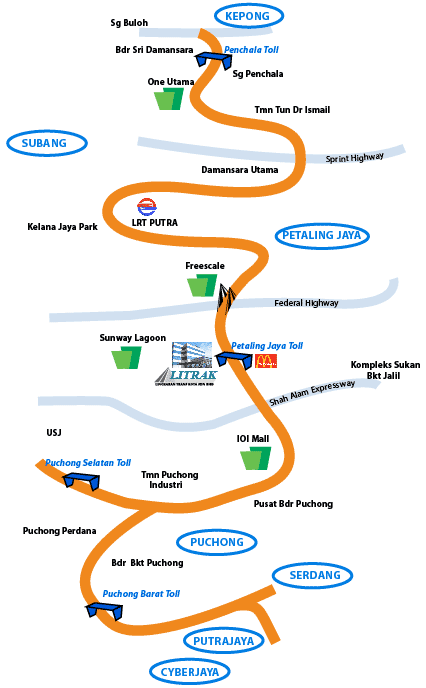-
Be that as it may, the Malaysian government's approach, whether BN or PR, to economic development and wealth management must be drastically revamped. Here are some possible policy approaches.
-
Petronas funds to be moved from Consolidated Revenue to a Malaysian sovereign wealth fund
-
Key directors of the MSWF should be Tengku Razaleigh Hamzah, Tan Sri Robert Kuok, Ananda Krishnan, Tan Sri Quek Leng Chan and Tan Sri Teh Hong Piow. These are M'sians who have a proven track record of financial astuteness. These M'sians can be entrusted to have M'sia's best interests at heart.
-
The MSWF will be value-neutral investing only in assets and funds worldwide that will provide the best financial yields. The MWSF is to be preserved for future generations of M'sians. We can work out the details in due course.
-
No longer can Petronas funds be used for subsidies of consumption goods which are short-term and renders the M'sian economy inefficient and uncompetitive.
-
Nationalise toll roads
The M'sian govt must take over the toll operations. This can be done through raising sovereign debt which will have a triple-A rating based on the cashflow from toll collections. By sovereign debt, I mean Treasury Bonds aka Malaysian Government Securities.
-
This move will remove the rent-seeking formula endemic in toll collections. It will ensure that surplus and profits go straight into the Consolidated Revenue. It will help to offset the removal of Petronas funds from the Consolidated Revenue.
-
Reduce the income tax top bracket to 18%
This will stimulate greater private sector-led economic activity and attract more foreign direct investments ("FDI"). The influx of capital will generate economic activity that will offset the lower income tax rates.
-
Tenaga to acquire all IPPs
IPPs are protected by the unfair Power Purchase Agreements ("PPA") which forces Tenaga Nasional to purchase all power generated by the IPPs. We are told that Petronas is also subsidising the fuel consumed by these IPPs. Consumers are being forced to absorb the increased costs via higher electricity tariffs. This is classic rent-seeking behaviour.
-
The government must do a work-out for Tenaga to acquire the IPPs. Tenaga can do a massive bond-raising exercise to acquire the IPPs with the government to stand as a sovereign guarantor. The consolidated cashflow from the IPPs and Tenaga's own operations combined with the sovereign guarantee should make these bonds attractive and be given a triple-A rating.
-
I know there are brickbats thrown at Tenaga. But it is still a better vehicle that can be audited as opposed to the opaque structure that currently exists. Furthermore, the PPAs are under the Official Secrets Act, apparently. That is a sham!
-
Reduce importation of foreign workers
This will force M'sian companies to increase their efficiencies and shift from labour-intensive activities to more capital-intensive ones. It will also force M'sian businesses to move further up the value chain of goods and services.
-
Increase vocational training institutions
To meet the shift up the value chain, M'sian workers must acquire new skill sets. Greater fiscal resources must be directed towards the establishment of more vocational institutions.
-
Reduction of the defence budget
No more hardware acquisitions such as submarines. The reduced defence budget should give priority to the standing Army, smaller surface coastal vessels for the Navy and, only towards replacement of Air Force hardware (no more net increases).
-
Removal of tariffs for automotive industry
This protectionist measure has only benefited an inefficient local automotive industry and the rent-seekers that own it. It has made M'sians pay exhorbitant prices for imported motor vehicles. Worse still, this policy has cost M'sia FDIs from the automotive industry and allowed Thailand to create an automotive hub. A major loss of FDI. And, M'sian automotive workers has the correct skill sets for such FDIs! A wasted opportunity.
-
Increase efficiency of public transportation
-
No more rent-seekers to operate public transportation i.e. buses and light-rails. A government-owned Public Transport Authority must be formed to nationalise public transportation. Private-sector rent-seekers are prone to making decisions that are sub-optimal to the public but are super-beneficial to the rent-seekers who don't even use public transportation.
-
Maintain English as a medium of instruction for Science and Maths
No reverting to Bahasa Malaysia for Science and Maths. I am hearing ridiculous pronouncements from Hishamuddin's Ministry of Education about a reversion to BM. If the rural constituents are suffering then create a full BM curriculum for the rural areas. It does not have to be a "one-size-fits-all" education policy.
-
Prior to the 1970s, before the odious Rahman Yaakub became Education Minister, M'sia's education addressed this type of education product differentiation. Hisham should read the history of his own Ministry. He shouldn't have to wait for bloggers to remind him!
-
This is not a full list, of course
There's a lot here to digest and discuss. What I have outlined is not complete. But it is a start. Solutions are available if we all apply our minds to it. But we need a real federal government that is responsive and genuinely concerned about moving Malaysia forward. The rakyat has been sanguine in the past in accepting a paternalistic form of governance.
-
But, the trust is lost. More so because of the present (and past) government's inability to forward-plan. The federal government's obssession is clearly directed at creating rent-seeking opportunities for their cronies. Change is necessary.
-
The economic storm is coming. We are witnessing a phenomenon that was forgotten since the 1970s. It is called STAGFLATION; a stagnating economy with inflationary pressure (see
http://en.wikipedia.org/wiki/Stagflation). No more time to lose, people!
 .
.
